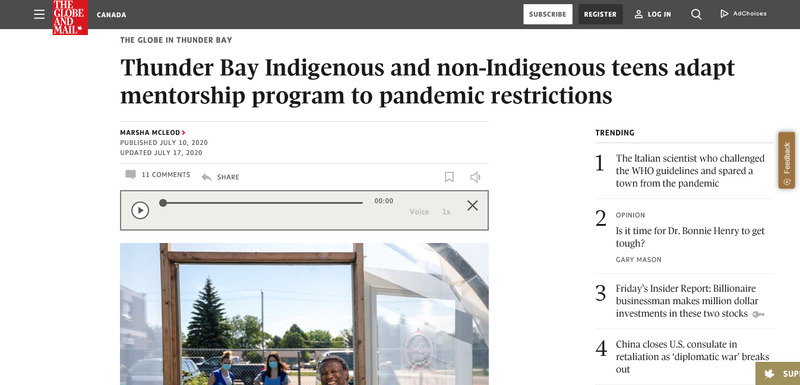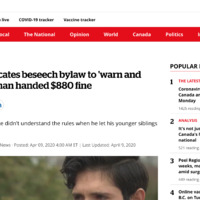Item
Thunder Bay Indigenous and non-Indigenous teens adapt mentorship program to pandemic restrictions
Title (Dublin Core)
Thunder Bay Indigenous and non-Indigenous teens adapt mentorship program to pandemic restrictions
Description (Dublin Core)
An in-depth article looking at the way Regional Multicultural Youth Council of Northern Ontario and its director Moffat Makuto are attempting to adapt and continue to support the community during the pandemic when they were already struggling financially prior to this event.
"The pandemic presented a new challenge to the 70-year-old restaurant owner and executive director of the Multicultural Association of Northwestern Ontario, which is the council’s parent organization.
"'Continuity when you work with young people is very important,' Mr. Makuto said.
"Before the pandemic, the council met weekly, often at the centre, to plan their many initiatives. For instance, the council held a monthly discussion with high-schoolers from across the city on relevant issues. One session before the shutdown focused on how to create safer schools for LGBTQ2S students.
"Council meetings have since moved online, but Mr. Makuto said it’s been difficult to organize, as some young people lack enough data on their phones to participate or were relying on local libraries for internet access.
"The council would also normally run after-school programming – and provide food – on weekdays at Dennis Franklin Cromarty High School, which serves First Nations students, including those who come to Thunder Bay for school from home communities in Northern Ontario."
"The pandemic presented a new challenge to the 70-year-old restaurant owner and executive director of the Multicultural Association of Northwestern Ontario, which is the council’s parent organization.
"'Continuity when you work with young people is very important,' Mr. Makuto said.
"Before the pandemic, the council met weekly, often at the centre, to plan their many initiatives. For instance, the council held a monthly discussion with high-schoolers from across the city on relevant issues. One session before the shutdown focused on how to create safer schools for LGBTQ2S students.
"Council meetings have since moved online, but Mr. Makuto said it’s been difficult to organize, as some young people lack enough data on their phones to participate or were relying on local libraries for internet access.
"The council would also normally run after-school programming – and provide food – on weekdays at Dennis Franklin Cromarty High School, which serves First Nations students, including those who come to Thunder Bay for school from home communities in Northern Ontario."
community, indigenous, youth, public programs, food security
Date (Dublin Core)
Creator (Dublin Core)
Contributor (Dublin Core)
Type (Dublin Core)
Article
Link (Bibliographic Ontology)
Publisher (Dublin Core)
The Globe and Mail
Controlled Vocabulary (Dublin Core)
Curator's Tags (Omeka Classic)
Collection (Dublin Core)
Linked Data (Dublin Core)
Date Submitted (Dublin Core)
07/10/2020
Date Modified (Dublin Core)
07/24/2020
This item was submitted on July 10, 2020 by Hope Gresser using the form “Share Your Story” on the site “A Journal of the Plague Year”: https://covid-19archive.org/s/archive
Click here to view the collected data.

